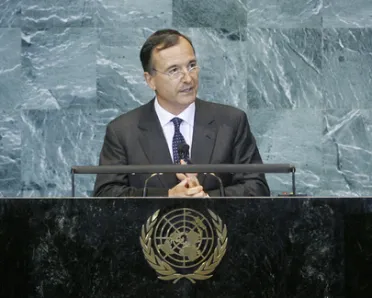Statement
Statement summary
FRANCO FRATTINI, Minister of Foreign Affairs of Italy, said that his country was a strong supporter of the United Nations central role in governance and the management of international crises. By virtue of its universality and impartiality, the Organization had the legitimacy to intervene in such crises. Italy participated in peace-keeping missions not only by contributing large numbers of highly-qualified troops, but by drafting strategic plans and doctrine, and providing training and logistical support. Approximately 8,000 Italian troops were assigned to United Nations peacekeeping, with a presence spread across 22 missions throughout the world.
In order to meet the challenges of the twenty-first century, he said that the United Nations system must be strengthened, starting with its capacity to contribute to the maintenance of international peace and security. The international community must continue to foster synergies between the United Nations and regional organizations that played a key role in bringing peace to crisis areas, namely the African Union and the European Union. The Treaty of Lisbon included new arrangements for the European Union’s international representation. Once the resolution on its participation in the work of the United Nations was finally approved, he hoped the Union would be able to make a greater contribution to the responsibilities of the General Assembly.
He went on to say that the time had come for the international community and the United Nations to increase their commitment to two regional crises, namely in Somalia and Pakistan. But in addition to providing aid, the international community must act wisely, and in this light Italy had called for new trade measures to increase market access for Pakistani goods and bolster Pakistan’s economic recovery. In Somalia, international support for African Union Mission in Somalia (AMISOM) must be stepped up.
Warning against the risks of relativism, he said there could not be a fruitful dialogue among cultures without universal values. Affirming that human beings were the measure of all things, the Italian Government had promoted a campaign for the moratorium on the death penalty and welcomed the consolidation of an international trend towards achieving that objective. He also said that Italy was profoundly committed to protecting the freedom of religion, and would always oppose discrimination against religious minorities. Another target in the fight against discrimination was the initiative to ban female genital mutilation.
He said that women’s rights and national progress went hand in hand, but that women continued to suffer in many countries throughout the world. By pooling efforts, the international community could ensure the necessary consensus for resolutions that safeguarded this and future generations from prejudice and intolerance. In this spirit, he welcomed the creation of UN Women within the Secretariat. With regards to United Nations reform, he said Italy sought a realistic compromise solutions for the reform of the Security Council and solutions that garnered the broadest possible consensus. More than 15 years of negotiations had proven that the membership was profoundly divided, and it was now time to search for genuine and far-reaching compromise. The vision of the future to which Italy aspired — peaceful coexistence and mutual enrichment between values and cultures — could only be ensured through the successful completion of the many reform processes under way.
Full statement
Read the full statement, in PDF format.
Photo

Previous sessions
Access the statements from previous sessions.
